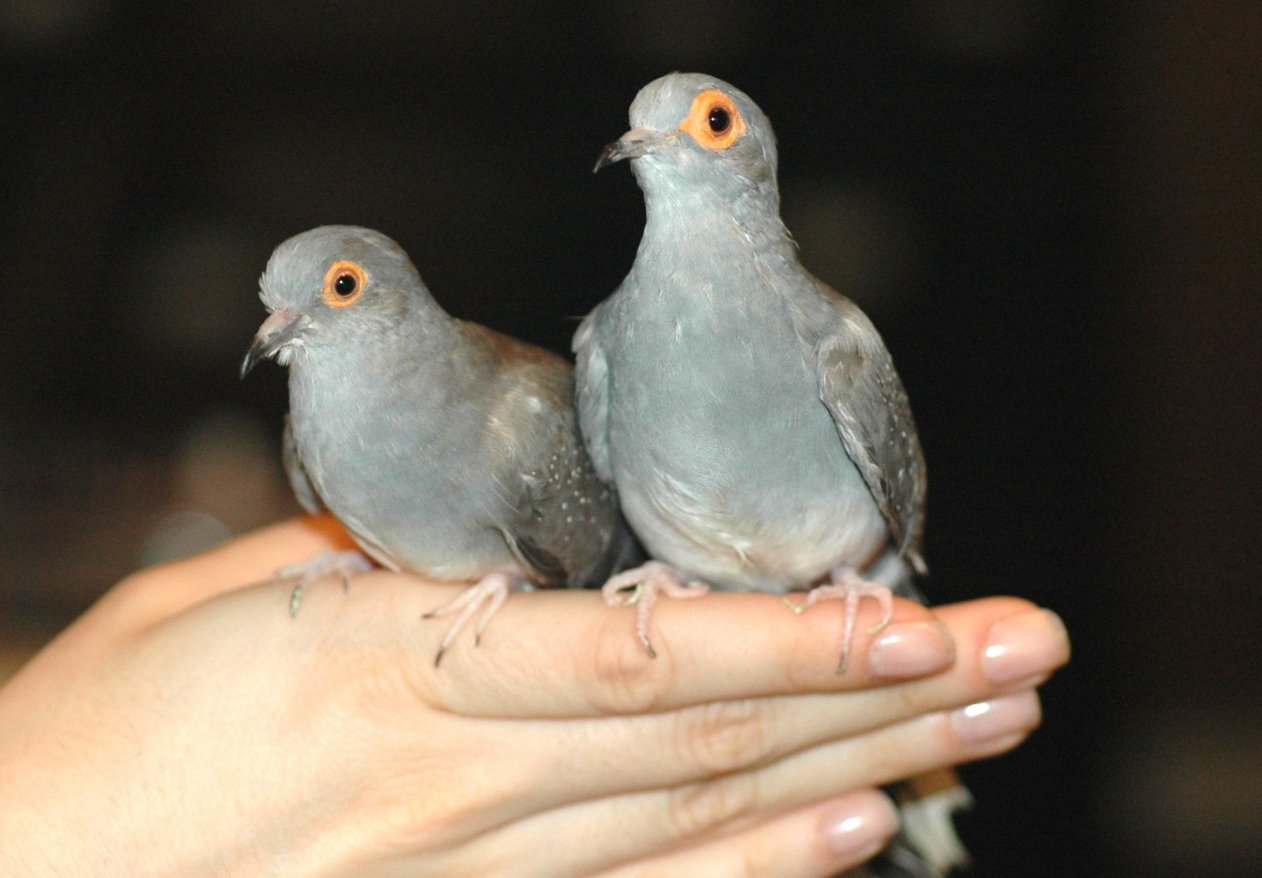Key Takeaways
- Diamond doves are small, gentle birds ideal for companionship, either alone or in pairs.
- These doves typically lay eggs every few weeks, especially if kept in pairs.
- A suitable cage for a diamond dove should be at least 18x18x24 inches to allow adequate movement.
- They thrive on a diet of seeds, grains, and fresh greens, with occasional supplements.
- Diamond doves can live up to 10 years with proper care and attention.
Quick Facts About Diamond Doves
Diamond doves are small, delicate birds known for their striking appearance and gentle demeanor. Originating from Australia, these birds have become popular pets worldwide due to their manageable size and relatively easy care requirements. Their name comes from the distinctive white spots on their wings, which resemble diamonds.
Understanding Diamond Dove Characteristics
Understanding the unique characteristics of diamond doves is essential for anyone considering them as pets. They have specific needs and traits that set them apart from other pet birds, making them an intriguing choice for bird enthusiasts.

“My little diamond dove, Xel! : r/PetDoves” from www.reddit.com and used with no modifications.
Size and Appearance
Diamond doves are petite, usually measuring around 7.5 to 8 inches in length. Their plumage is generally a soft gray, highlighted by the striking white “diamond” spots on their wings. This elegant appearance is complemented by bright orange eyes and a reddish ring around them, adding to their charm.
Their small size makes them suitable for smaller living spaces, but they still require room to fly and exercise. It’s important to provide them with a cage that allows for plenty of movement and perching opportunities.
Temperament and Behavior
These doves are known for their calm and gentle nature. They are not overly active, making them an excellent choice for those who prefer a quieter pet. Diamond doves can be quite affectionate with their owners, often enjoying sitting on a finger or shoulder. However, patience is required when taming them, as they can be timid initially.
They are social creatures and enjoy the company of other doves or even different bird species, provided they are compatible. Keeping them in pairs is often recommended to prevent loneliness, but single doves can thrive with adequate human interaction.
Vocalizations
Unlike some larger bird species, diamond doves are not loud. Their cooing is soft and pleasant, often described as soothing. This makes them ideal for people who prefer quieter pets. Understanding their vocalizations can also help in determining their mood or if they require attention. For those interested in rescue pet adoption, knowing the vocal habits of potential pets can be crucial in creating a harmonious home environment.
Adopting and Rescuing Diamond Doves
Before bringing a diamond dove into your home, it’s crucial to understand the adoption and rescue process. This ensures that you find a healthy bird and are prepared to meet its needs.
Where to Find Diamond Doves
Diamond doves can be found in pet stores, through breeders, or in bird rescue organizations. Each option has its pros and cons. Pet stores may offer convenience, but breeders often provide more detailed information about the bird’s background. Rescuing a bird can be rewarding, giving a home to a dove in need.
Adoption Process
The adoption process typically involves selecting a healthy bird and ensuring you have the necessary supplies and knowledge to care for it. When choosing a diamond dove, look for signs of good health such as bright eyes, clean feathers, and an active demeanor. It’s also wise to ask about the bird’s diet and any special care it might need. For more tips, consider reviewing a rescue pet home preparation guide to ensure you’re fully prepared for your new feathered friend.
Example: When adopting from a rescue, you might find a bonded pair that requires rehoming together. This could be an excellent opportunity to provide a loving home to two doves that already have a connection.
Once you’ve selected your dove, make sure you have a suitable cage, food, and enrichment items ready at home. It’s important to create a welcoming environment from the start.
Rescue Considerations
Rescuing a diamond dove can be a fulfilling experience, but it comes with unique considerations. Birds from rescues may have had previous health issues or behavioral challenges. It’s crucial to inquire about the bird’s history and any special requirements they might have.
Rescue organizations often provide ongoing support and advice, which can be invaluable for first-time bird owners. They may also offer resources for avian veterinarians and other services that can aid in your dove’s care.
Companion or Breeding: Choosing the Right Setup
Deciding whether to keep diamond doves as companions or for breeding is an important choice. Each setup has its benefits and challenges, and understanding these can help you make the best decision for your situation. For more detailed guidance on caring for these birds, you can visit the Diamond Dove Home Page.
In the next part, we will delve deeper into the options for keeping diamond doves as single pets or in pairs, and discuss the intricacies of breeding these beautiful birds.
Single Pets: Pros and Cons
Keeping a diamond dove as a single pet can be a rewarding experience, especially for those who can dedicate time to interact with their bird. Single doves often bond closely with their human companions, enjoying gentle handling and attention. This can lead to a strong, affectionate relationship, with the dove often seeking out its owner for companionship.
However, there are some challenges to consider. A single dove may become lonely if left alone for extended periods, leading to stress or behavioral issues. It’s crucial to ensure they receive enough social interaction daily. Providing a variety of toys and activities can help keep them entertained and mentally stimulated.

“Diamond Dove Home Page – Living With Doves” from www.diamonddove.info and used with no modifications.
Keeping Pairs: Benefits and Challenges
On the other hand, keeping diamond doves in pairs can offer numerous benefits. These birds are naturally social and often thrive in the company of another dove. Paired doves will engage in mutual preening, cooing, and other bonding activities, which can be delightful to observe. This setup can reduce the need for constant human interaction, as the doves provide companionship for each other.
However, there are also challenges. Pairs may become more focused on each other and less interested in human interaction. Additionally, if not managed properly, pairs may frequently breed, resulting in more eggs than desired. It’s important to have a plan for managing egg-laying and any potential offspring.
Breeding Considerations and Care
For those interested in breeding diamond doves, there are several important factors to consider. Breeding pairs require a stable environment with adequate space and resources. A larger cage is necessary to accommodate both the birds and their offspring comfortably.
Breeding doves can be a rewarding endeavor, but it requires commitment and knowledge. It’s essential to understand the breeding cycle and be prepared to care for the chicks. This includes providing a proper nesting area, ensuring a balanced diet, and monitoring the health of both parents and chicks. For those interested in expanding their knowledge about pet care, consider exploring foster pets dos and don’ts to better prepare for the responsibilities involved.
Essential Care for Diamond Doves as Pets
Proper care is vital for keeping diamond doves healthy and happy. This involves meeting their basic needs and providing an enriching environment that stimulates their natural behaviors.
Firstly, it’s crucial to establish a routine that includes regular feeding, cleaning, and interaction. Diamond doves thrive on consistency, and a stable environment helps reduce stress and promote well-being.
Secondly, understanding their dietary needs is key. These birds require a balanced diet to maintain their health and energy levels. For more information on how to welcome birds into your home, check out these foster pet guidelines.
- Provide a mix of seeds and grains as their primary diet.
- Include fresh greens and vegetables for added nutrition.
- Occasionally offer calcium supplements, especially during breeding periods.
Besides diet, regular health check-ups with an avian veterinarian are recommended to catch any potential health issues early.
Housing Requirements
Diamond doves need a well-designed cage to live comfortably. The cage should be spacious enough to allow for flying and perching. A minimum size of 18x18x24 inches is recommended for a single dove, with larger dimensions needed for pairs or breeding setups.
Ensure the cage is placed in a quiet area of the home, away from direct sunlight and drafts. Include perches of varying sizes and textures to promote foot health, and provide a shallow dish of water for bathing, as diamond doves enjoy keeping their feathers clean. For more information on preparing your home for a pet, you can refer to this rescue pet home preparation guide.
Feeding and Nutrition
A balanced diet is essential for maintaining a diamond dove’s health. Their diet should primarily consist of a quality seed mix designed for small birds. Supplement this with fresh greens like spinach or kale, and offer small amounts of fruit as an occasional treat. For more information on how to care for birds, you might find these best practices for fostering birds helpful.
It’s also important to provide a source of calcium, such as cuttlebone or mineral blocks, to support bone health and egg production. Fresh, clean water should be available at all times, and food dishes should be cleaned regularly to prevent contamination.
Health and Veterinary Care
Regular veterinary care is crucial for preventing and managing health issues in diamond doves. Schedule routine check-ups with an avian vet to ensure your dove is in good health. Watch for signs of illness, such as changes in appetite, droppings, or behavior, and seek veterinary advice if you notice anything unusual. For more information on preparing your home for a new pet, visit our pet home preparation guide.
Keeping their environment clean and providing a balanced diet are essential preventive measures. Vaccinations and treatments for common avian diseases may also be recommended by your vet.
Environmental Enrichment
Enrichment is vital for keeping diamond doves mentally and physically stimulated. Provide a variety of toys, such as bells, mirrors, and swings, to encourage exploration and play. Rotate toys regularly to maintain interest and prevent boredom.
Additionally, allowing your dove supervised out-of-cage time can offer further enrichment and exercise opportunities. Ensure the area is safe and free from hazards, and always supervise interactions with other pets or family members.
Understanding Egg-Laying Patterns
Understanding the egg-laying patterns of diamond doves is important for managing their care, especially if you keep them in pairs. These birds can be prolific breeders, and knowing what to expect can help you prepare for any potential chicks.
Frequency of Egg Laying
Diamond doves typically lay eggs every few weeks, particularly if kept in pairs. For those interested in fostering birds, each clutch usually consists of two eggs, and the incubation period lasts about 14 days. After hatching, the chicks will fledge and leave the nest in approximately two to three weeks.
If you do not wish to breed your doves, consider removing eggs shortly after they are laid to discourage further laying. Alternatively, providing dummy eggs can help satisfy their nesting instincts without resulting in chicks. For more information on preparing your home for pet care, check out our pet home preparation guide.
In the final part, we’ll explore how to create a bond with your diamond dove and address some frequently asked questions to ensure you have all the knowledge you need for successful dove care.
Managing Eggs and Chick Care
When it comes to managing eggs and chick care, it’s essential to be prepared and informed. If your diamond doves are breeding, you’ll need to provide a safe and comfortable environment for both the parents and the chicks. Nesting materials such as soft hay or shredded paper can be placed in the cage to encourage nesting behavior and provide a comfortable spot for egg-laying. For more detailed information on caring for diamond doves, you can visit this resource.
Once the eggs are laid, ensure that the parents have access to a high-calcium diet to support their nutritional needs during incubation. It’s crucial to avoid disturbing the nest during this period to prevent stress. After the chicks hatch, monitor their growth and development closely. The parents will feed them regurgitated food, but you may need to supplement their diet with special chick food if the parents are unable to provide enough nourishment.
As the chicks grow, ensure they have enough space to explore and practice flying within the safety of the cage. Socialization is key during this period, so gentle handling can help them become accustomed to human interaction. For more tips, consider reading about the dos and don’ts of fostering pets.
Creating a Bond with Your Diamond Dove
Building a strong bond with your diamond dove can be a rewarding experience for both you and the bird. These gentle creatures can become affectionate companions with the right approach and patience.
Building Trust Through Interaction
The foundation of a good relationship with your diamond dove starts with trust. Spend time near their cage daily, speaking softly to them to help them get used to your presence and voice. Gradually, you can begin offering treats through the cage bars to encourage them to associate you with positive experiences. For more insights, explore the advantages of adopting birds.
Once your dove seems comfortable, try opening the cage door and allowing them to explore the space around it. Offer your finger as a perch and be patient. It may take several attempts before they feel secure enough to step onto your hand. For more tips on creating a welcoming environment for your pet, check out this home preparation guide.
Consistency is key. Regular, gentle interactions will help your dove feel safe and secure, strengthening the bond between you. For more insights on pet care, consider reading about the advantages of adopting birds.
Training and Handling Tips
Training your diamond dove can be a fun and fulfilling process. Start with simple tasks, like teaching them to step up onto your finger or a perch. Use treats and praise as positive reinforcement to encourage desired behaviors.
Handling should always be gentle and calm. Avoid sudden movements that might startle your dove. Instead, approach them slowly and speak softly to reassure them. Regular handling can help your dove become more comfortable with human contact, enhancing your bond.
Final Thoughts on Diamond Dove Care
Caring for a diamond dove can be a delightful and enriching experience. These small, gentle birds are relatively easy to care for, making them suitable for both novice and experienced bird owners. With the right environment, diet, and social interaction, your diamond dove can thrive and become a cherished companion.
Remember to be patient and consistent in your care and interactions. Building a bond with your dove takes time, but the rewards of a trusting and affectionate relationship are well worth the effort.
Frequently Asked Questions
Here are some common questions about diamond dove care to help you better understand these wonderful birds:
Can diamond doves live alone or do they need a companion?
Diamond doves are social creatures and generally do well with a companion. However, they can live alone if they receive ample human interaction. If you choose to keep a single dove, be sure to spend time with them daily to prevent loneliness. For more insights on providing the best care, check out these dos and don’ts of fostering pets.
How often do diamond doves lay eggs?
Diamond doves can lay eggs every few weeks, especially if kept in pairs. Each clutch usually consists of two eggs, and the incubation period is about 14 days. If you do not wish to breed your doves, consider using dummy eggs to discourage further laying.
- Remove real eggs shortly after they are laid.
- Replace them with dummy eggs to satisfy nesting instincts.
- Monitor your doves’ behavior and adjust as needed.
Managing egg-laying can help maintain your doves’ health and prevent overpopulation. Learn more about best practices for pet rescue organizations to support your efforts.
What should I feed my diamond dove?
Diamond doves thrive on a diet of seeds, grains, and fresh greens. A high-quality seed mix designed for small birds should form the basis of their diet. Supplement this with fresh vegetables like spinach and kale, and offer small amounts of fruit as treats.
Calcium sources, such as cuttlebone or mineral blocks, are important for bone health and egg production. Always provide fresh, clean water and clean food dishes regularly.
How big does a diamond dove cage need to be?
A suitable cage for a diamond dove should be at least 18x18x24 inches to allow for adequate movement and exercise. If you have multiple doves or plan to breed them, opt for a larger cage to accommodate their needs.
Ensure the cage has perches of varying sizes and textures, as well as a shallow dish for bathing. Place the cage in a quiet area of your home, away from direct sunlight and drafts, to create a comfortable environment for your dove.


